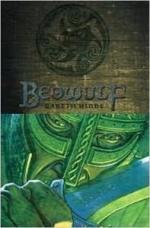In v. 1997 ff. this same idiom occurs, and was noticed in B.’s great article on Beowulf, which appeared about the time I published my reading of 1599 and 2027. Translate 1997 then: Wouldst let the South-Danes themselves decide about their struggle with Grendel. Here ‘Sueth-Dene’ is accus. of person, and ‘guethe’ is gen. of thing agreed on.
With such collateral support
as that afforded by B. (P. and B. XII.
97), I have no hesitation
in departing from H.-So., my usual guide.
The idiom above treated runs
through A.-S., Old Saxon, and other
Teutonic languages, and should
be noticed in the lexicons.
[2] ‘Broden-mael’
is regarded by most scholars as meaning a damaskeened
sword. Translate:
The damaskeened sword burned up. Cf. 25_16
and
note.
[3] ‘Cyning-balde’ (1635) is the much-disputed reading of K. and Th. To render this, “nobly bold,” “excellently bold,” have been suggested. B. would read ‘cyning-holde’ (cf. 290), and render: Men well-disposed towards the king carried the head, etc. ‘Cynebealde,’ says t.B., endorsing Gr.
XXV.
BEOWULF BRINGS HIS TROPHIES.—HROTHGAR’S GRATITUDE.
{Beowulf relates his last exploit.}
Beowulf
spake, offspring of Ecgtheow:
“Lo!
we blithely have brought thee, bairn of Healfdene,
Prince
of the Scyldings, these presents from ocean
Which
thine eye looketh on, for an emblem of glory.
5
I came off alive from this, narrowly ’scaping:
In
war ’neath the water the work with great pains
I
Performed,
and the fight had been finished quite nearly,
Had
God not defended me. I failed in the battle
Aught
to accomplish, aided by Hrunting,
10 Though
that weapon was worthy, but the Wielder of earth-folk
{God was fighting with me.}
Gave
me willingly to see on the wall a
Heavy
old hand-sword hanging in splendor
(He
guided most often the lorn and the friendless),
That
I swung as a weapon. The wards of the house then
15 I killed
in the conflict (when occasion was given me).
Then
the battle-sword burned, the brand that was lifted,[1]
As
the blood-current sprang, hottest of war-sweats;
Seizing
the hilt, from my foes I offbore it;
I
avenged as I ought to their acts of malignity,
20 The murder
of Danemen. I then make thee this promise,
{Heorot is freed from monsters.}
Thou’lt
be able in Heorot careless to slumber
With
thy throng of heroes and the thanes of thy people
Every
and each, of greater and lesser,
And
thou needest not fear for them from the selfsame direction
25 As thou
formerly fearedst, oh, folk-lord of Scyldings,
[58] End-day for earlmen.” To the age-hoary
man then,




